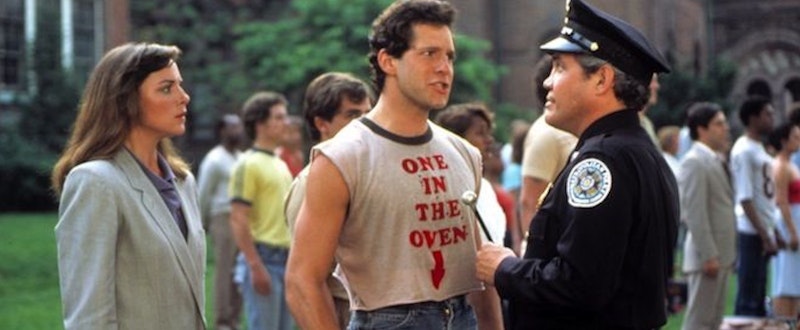Everyone has gaps. Charlie Day has never seen a John Cassavetes film. Quentin Tarantino has seen only three films by Ingmar Bergman. Before last month, I hadn’t seen any of the Police Academy movies. Not the 1984 Hugh Wilson original, or 2, 3, 4, 5, 6, nor 7: Mission to Moscow. Save 7, all of these movies came out once a year from 1984 to 1989. After the sleeper hit success of the first one, Police Academy became one of the iconic American film franchises of the 1980s. During his speech at the 2016 DNC, Bill Clinton said something about Hillary finding “his parenting choices questionable, after [watching] six Police Academy movies back-to-back with Chelsea.” (The first Police Academy is the former President’s favorite movie, and he confided in Steve Guttenberg that “it got me through a very hard time.”)
Like The Princess Bride, A Christmas Story, The Karate Kid, Gremlins, and many popular American family films from the 1980s, I never saw any of the Police Academy movies growing up. The kind of mainstream comedy that ran through the series just seemed passé, reminiscent of other disappointing 1980s comedies like Revenge of the Nerds, Caddyshack, and 1978’s absurdly overrated Animal House. Now, I never saw them, but Police Academy is still popular enough that it’s known through osmosis. All of its stars, save perhaps Michael Winslow (remember him at Bonnaroo with Animal Collective in 2013? Nick? Alex? Are you out there…?), have faded into obscurity. Kim Cattrall is the female lead in the first one, but doesn’t appear in any others; Colleen Camp has a tantalizingly small role in 2, and a one scene cameo in 4, but other than them, and occasional guest villains played by Rene Auberjonois and Christopher Lee, you’ve got the gang: Bubba Smith, David Graf, Marion Ramsey, Leslie Easterbook, G. W. Bailey, Michael Winslow, and Steve Guttenberg (until 5…).
Police Academy is the only entry in the series rated R, and besides one of the funniest throwaway lines I’ve ever heard—someone wakes Guttenberg up to play a prank, he says he’s tired, the other guy persists, and Guttenberg casually gets up and just says, “You’re right. Sleep is for fags”—there’s a particularly revealing moment somewhere just past the middle. Cattrall approaches the station, and someone walking by tells her a riot’s broken out downtown. “But how?” she asks. He shrugs. “Who knows how these things get started?” Unlike the 1970s, the status quo of the United States government was emphasized and reinforced in popular cinema. Gangs, not just in Police Academy, don’t look like they’re out of any ghetto, but the music video for “Thriller.” The Police Academy series is an essential text of Regan’s America, a place where blunt homophobia is out in the open along with boneheaded racism, mitigated by the relatively diverse cast.
But it’s the anti-gay stance of Police Academy that’s not only an example of how evil “innocuous entertainment” can be, but also a reflection of the cruelty of a country laughing at a group of people dying by the thousands—a movie a year, every year, from 1984 to 1989. When someone wants to fuck with someone else in a Police Academy movie, they send them to The Blue Oyster Bar, a rather plain gay bar filled with mustaches and leather. It’s the same device as leaving someone by the side of the road, or in a den full of zoo animals—what’s the implication? That G. W. Bailey is going to get gang raped in The Blue Oyster Bar, ALL HOLES FILLED.
The racism of the Police Academy movies is a bit less prominent than Sixteen Candles, for example, whose Criterion reissue was put on the kibosh years ago because of “Long Duck Dong.” Although Police Academy stars many black actors, there’s always jokes at the expense of Asian characters, people confusing China, Japan, and Korea (G. W. Bailey gets chased by pandas in Tokyo), and Winslow’s reoccurring bit imitating the inconsistent dubbing of kung-fu movies. Winslow’s whole schtick is emblematic of 1980s comedy, and while it’s undeniably impressive, it’s really fucking stupid, and after seven movies, lazy writing, if any at all. I had to watch all of these movies for research on another project, and I’ll say they’re consistent, all about as good and bad as the next.
But what I realized watching all of these popular comedies released in the second half of the 1980s was that this was the same vein of mainstream comedy that I’d start seeing regularly by the end of the 1990s. By then, Adam Sandler was releasing a movie a year, but he was relatively “progressive” for a blockbuster Hollywood comedian: none of his movies are as homophobic or racist as the work of contemporaries the Farrelly Brothers, or even his successor, Judd Apatow. I find much more toxic bro ideology in Apatow’s largely improvised masses of film than Sandler’s tightly-constructed classical comedies, and the Farrelly’s speak for themselves. But even in Little Nicky, Beefy the talking dog and the two Satanist metalheads make gay jokes at the expense of the struggling actor played by Allen Covert—and he’s not even gay! Sandler’s Nicky accidentally peeps on a crossdresser dancing to “Two of Hearts” in his apartment, and apologizes before floating up. Clint Howard’s “Nipples” shows up once more, and he’s just like everyone else, about to go to Hell.
If a crossdresser ever showed up in the Police Academy movies, they’d be shot on sight. Sleep is for fags.
—Follow Nicky Smith on Twitter: @nickyotissmith

